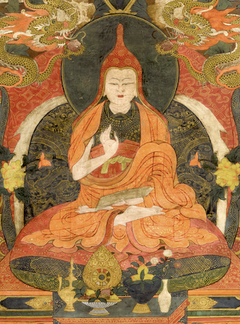The Vajra Mirror
The Vajra Mirror
Eliminating Doubts Concerning Self-Awareness
by Mipham Rinpoche
Namo Mañjuśriye!
Those of little learning and no experience
Believe that “self-awareness” in Dzogchen
Occupies an inferior position
To the Madhyamaka’s wisdom of equipoise.
Ah! You who presume to follow the Middle Way,
Tell me: when remaining in the dharmadhātu,
Is interrupted or not? What do you believe?
If you say it is, that’s perceptionless meditation.
But if you hold to the second option,
Is it mind that experiences dharmatā or not?
If not, how is this true nature realized?
If it is mind, then since dharmatā
Is the nature of all phenomena,
Do things themselves appear without obstruction
Before the subjective mind or not?
If they do, how has dualistic perception faded?
But if they don’t, yet in the absence of objects
There is so-called “experience” of the mind,
What is it like? Can you put your finger on it?
If you claim that it is merely wisdom,
Knowing itself individually, without separation
Between object and subject,
Such an experience is “self-awareness”.
Therefore, to understand self-awareness
As the clear awareness of Mind Only,
Or as a limited form of emptiness
Lacking knowledge of external objects’ non-existence
Is talk unrelated to an experience of how things are.
The dharmadhātu, which is beyond conception,
Is experienced individually and reflexively
In space-like meditative equipoise.
How is this a ‘limited’ nature?
Mind Only believes consciousness to be real.
But here, self-awareness is great emptiness.
In actual direct experience, any rigid notions
Or concepts of true existence fall apart.
Whoever experiences this open space of unity
Sees the actual nature of all phenomena.
For if each thing had its own separate nature,
There would be no end to all these natures.
Thus it is through the experiential approach
Of settling meditatively in the space of unity
That you can come to realize what would be the fruit
Of many aeons of philosophical speculation.
Mipham Namgyal wrote down whatever came to mind during a break while staying at the mountain hermitage of Karmo Taktsang.
| Translated by Adam Pearcey, 2016.
Version: 1.3-20220810
